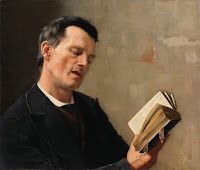TIMELESS HYMNS - A regular feature in which I choose a previous hymn blog, revise it and post it again. This one was first posted in 2014.
I clearly remember a few years ago sitting with some couples who were several years older than I was. They were talking about retirement and how they had also retired from all their responsibilities at church. They said that it was time to step aside and let somebody else do it. I was really taken back by this discussion and while I just listened, I thought how can one retire from serving the Lord, especially when there are so many opportunities and needs all around us.
Now I realize that as one gets older there are some things that become more difficult to do, especially with physical changes. But one can adjust and find ways to use the gifts that God has given. And retirement does provide more time to serve the Lord. Retirement in the Lord's work should not be an option. Readjustment may be a better choice.
Unfortunately, while I have been talking about older folks, the very same problem exists with others who are much younger. All sorts of things attract us and take us away from serving the Lord. Boats, cabins, races, sports, vacations, family, hobbies take us away from serving and worshipping on Sunday. Jobs, activities, recreation, hobbies limit our availability to serve during the week. More and more we have to hire professionals to cover areas of service and outreach once done by volunteers. Maybe we need to memorize and daily quote John 9:4, "As long as it is day, we must do the work of Him who sent Me. Night is coming, when no one can work." But do we really believe that.
Is the night coming soon? I think so. It may have been that verse that was behind the writing of this week's hymn, "We'll Work Till Jesus Comes". Sometimes dated 1829, the text was written by an unknown author. In many books the song appears as "Anonymous." Some authorities believe that it is from the American folk tradition.
In other books, it is attributed to Mrs. Elizabeth King Mills (1805-1829). The daughter of Philip King, she married Thomas Mills, who was a Member of Parliament. No other information about her is available, except that she was a poet who produced what was once a well known hymn, "We Speak of the Realms of the Blest." But no matter who wrote it, this hymn reminds us of the urgency of serving, while we still can.
The stanzas share the story of the Christian's pilgrimage from earth to heaven. In stanza 1 we are told that heaven is a land of rest for which we sigh. In stanza 2 we are told that in contrast this earth is not our home. In stanza 3 we are told that, therefore, we must flee to Jesus Christ for our rest. In stanza 4 we are told that Christ will help us through death. In stanza 5 we are told that finally our tears shall be wiped away. But the refrain sounds out the commitment, we'll work till Jesus comes ... and we'll be gathered home!
Have you "retired" from serving the Lord faithfully? Maybe this week we need to renew our commitment to serve and share the Gospel with the many that need the good news. The night is rapidly approaching when we can work no more.
(1) O land of rest, for thee I sigh!
When will the moment come
When I shall lay my armor by
And dwell in peace at home?
We'll work till Jesus comes,
We'll work till Jesus comes,
We'll work till Jesus comes,
And we'll be gathered home.
(2)"No tranquil joys on earth I know,
No peaceful, sheltering dome.
This world's a wilderness I know;
This world is not my home."
We'll work till Jesus comes,
We'll work till Jesus comes,
We'll work till Jesus comes,
And we'll be gathered home.
(3) To Jesus Christ I fled for rest;
He bade me cease to roam,
And lean for comfort on His breast
Till He conduct me home.
We'll work till Jesus comes,
We'll work till Jesus comes,
We'll work till Jesus comes,
And we'll be gathered home.
(4) I sought at once my Savior's side;
No more my steps shall roam.
With Him I'll brave death's chilling tide
And reach my heav'nly home.
We'll work till Jesus comes,
We'll work till Jesus comes,
We'll work till Jesus comes,
And we'll be gathered home.
(5) Our tears shall all be wiped away,
When we have ceased to roam;
And we shall hear our Father say,
'Come, dwell with Me at home.'"
We'll work till Jesus comes,
We'll work till Jesus comes,
We'll work till Jesus comes,
And we'll be gathered home.
Listen to it being sung here. LISTEN

















